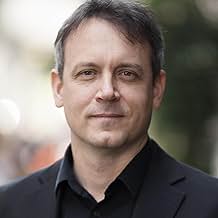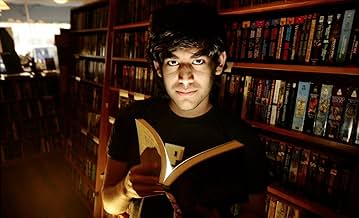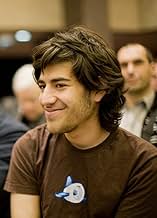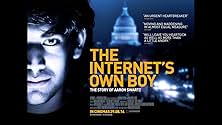The story of programming prodigy and information activist Aaron Swartz, who took his own life at the age of 26.The story of programming prodigy and information activist Aaron Swartz, who took his own life at the age of 26.The story of programming prodigy and information activist Aaron Swartz, who took his own life at the age of 26.
- Awards
- 4 wins & 4 nominations total
Aaron Swartz
- Self
- (archive footage)
Stephen Heymann
- Self - Asst. U.S. Attorney Massachusetts
- (archive footage)
- Director
- Writer
- All cast & crew
- Production, box office & more at IMDbPro
Storyline
Did you know
- Quotes
First Title Cards: Unjust Laws exist; shall we be content to obey them, or shall we edeavor to amend them, and obey them until we have suceeded, or shall we transgress them at once?- Henry David Thoreau
- ConnectionsFeatures The Wizard of Oz (1939)
- SoundtracksExtraordinary Machine
Written and Performed by Fiona Apple
Featured review
The story of Aaron Swartz, who killed himself at the age of 26, is sad but inevitable consequence of the world we inhabit.
From his earliest days, he was a prodigy, not only developing the skills of reading and processing information at an early age, but acquiring a unique ability to write programs and offer innovative solutions to many problems presented in the early years of the Internet. With the help of testimonies from Swartz's family, plus colleagues and friends including the inventor of the web, Tim Berners-Lee, Brian Knappenberger's film traces the meteoric career of a genius who appeared to be able to offer solutions that no one else could. More significantly, Swartz had the ability to communicate with his interlocutors, not just in small-group situations but in public arenas as well. This is what rendered him such a powerful figure; although physically diminutive, he had a gift for speech-making that proved hypnotic in its effect.
Matters came to a head, however, when Swartz hacked the JSTOR sits, an address used mostly for publishing scholarly journals across all disciplines, downloaded the information and made it available to all web users. This completely contravened JSTOR's principle, which was to make that information only available to subscribers, mostly in academic institutions. The principle might have been a noble one (why shouldn't all users have equal access to information, especially if it aids their research?), but the American government's response was predictably harsh, as they charged Swartz with a variety of crimes under an Act issued as long ago as the mid- Eighties.
Knappenberger's film suggests with some justification that this reaction was ludicrously out of proportion to the nature of Swartz's so-called 'crimes.' He had neither challenged the Constitution nor caused harm to others; on the contrary he had simply worked in the interests of democratization. He was the victim of the same kind of paranoia that underpinned the anti-communist campaigns six decades ago, when legions of innocent people were rounded up and made to 'confess' their alleged involvement with a plot to subvert the American way of life, even if they had not done anything. The same applied to Swartz, who was offered the promise of lenient legal treatment in exchange for a 'confession.'
The familiarity of Swartz's plight suggests that a climate of intolerance still exists in a country that consistently advertises its democratic credentials, especially when compared with other territories in the world. THE INTERNET'S OWN BOY suggests otherwise; if the government was truly democratic, it would either have understood Swartz's motives, or meted out the same harsh treatment to other criminals - such as those who precipitated the Wall Street crisis of 2008. But who said anything was truly equal in American society?
THE INTERNET'S OWN BOT is a polemical piece that leaves viewers feeling both angry and frustrated - angry that a talented soul like Swartz should have had his life cut brutally short, and frustrated that the government should have pursued such heavy-handed treatment. If the film can inspire more activism to try and change official policies, it will have achieved much.
From his earliest days, he was a prodigy, not only developing the skills of reading and processing information at an early age, but acquiring a unique ability to write programs and offer innovative solutions to many problems presented in the early years of the Internet. With the help of testimonies from Swartz's family, plus colleagues and friends including the inventor of the web, Tim Berners-Lee, Brian Knappenberger's film traces the meteoric career of a genius who appeared to be able to offer solutions that no one else could. More significantly, Swartz had the ability to communicate with his interlocutors, not just in small-group situations but in public arenas as well. This is what rendered him such a powerful figure; although physically diminutive, he had a gift for speech-making that proved hypnotic in its effect.
Matters came to a head, however, when Swartz hacked the JSTOR sits, an address used mostly for publishing scholarly journals across all disciplines, downloaded the information and made it available to all web users. This completely contravened JSTOR's principle, which was to make that information only available to subscribers, mostly in academic institutions. The principle might have been a noble one (why shouldn't all users have equal access to information, especially if it aids their research?), but the American government's response was predictably harsh, as they charged Swartz with a variety of crimes under an Act issued as long ago as the mid- Eighties.
Knappenberger's film suggests with some justification that this reaction was ludicrously out of proportion to the nature of Swartz's so-called 'crimes.' He had neither challenged the Constitution nor caused harm to others; on the contrary he had simply worked in the interests of democratization. He was the victim of the same kind of paranoia that underpinned the anti-communist campaigns six decades ago, when legions of innocent people were rounded up and made to 'confess' their alleged involvement with a plot to subvert the American way of life, even if they had not done anything. The same applied to Swartz, who was offered the promise of lenient legal treatment in exchange for a 'confession.'
The familiarity of Swartz's plight suggests that a climate of intolerance still exists in a country that consistently advertises its democratic credentials, especially when compared with other territories in the world. THE INTERNET'S OWN BOY suggests otherwise; if the government was truly democratic, it would either have understood Swartz's motives, or meted out the same harsh treatment to other criminals - such as those who precipitated the Wall Street crisis of 2008. But who said anything was truly equal in American society?
THE INTERNET'S OWN BOT is a polemical piece that leaves viewers feeling both angry and frustrated - angry that a talented soul like Swartz should have had his life cut brutally short, and frustrated that the government should have pursued such heavy-handed treatment. If the film can inspire more activism to try and change official policies, it will have achieved much.
- l_rawjalaurence
- Oct 24, 2014
- Permalink
- How long is The Internet's Own Boy: The Story of Aaron Swartz?Powered by Alexa
Details
- Release date
- Country of origin
- Official site
- Language
- Also known as
- Internets underbarn
- Production companies
- See more company credits at IMDbPro
Box office
- Gross US & Canada
- $48,911
- Opening weekend US & Canada
- $21,705
- Jun 29, 2014
- Gross worldwide
- $48,911
- Runtime1 hour 45 minutes
- Color
- Aspect ratio
- 1.78 : 1
Contribute to this page
Suggest an edit or add missing content

Top Gap
What is the Spanish language plot outline for The Internet's Own Boy: The Story of Aaron Swartz (2014)?
Answer

























